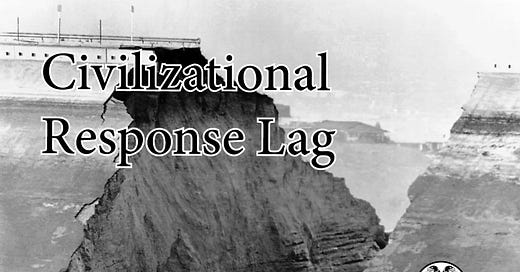In 2015, Ted Cruz scolded Barack Obama, saying that the worst periods of growth since WWII were during the Carter administration and the Obama administration.1 We don’t make a habit of defending Obama here, but it would seem that an economic slump that began in 2008 is probably not the fault of a president who took office in 2009.
Cruz’s reasoning is idiotic, but it’s not miles off from a lot of the amateur historiography that gets batted around casually, even in more respected circles. The gap between cause and effect is wildly underestimated depending on what the estimator wants to justify. For Jordan Peterson, Europe’s greatness was caused by its “Judeo-Christian” values.2 For Stephen Pinker, its greatness was caused by the Enlightenment.3 For J. K. Rowling, second-wave feminism did it all.4 In Cruz’s case, all of metaphysics is stood on its head, and cause follows effect.
Humans are accustomed to think on a human scale, usually not much beyond a single lifetime. But nature doesn’t work that way. Billions of years ago, the earth was covered from pole to pole in ice. This was caused by a small organism taking over, and the gap between cause and effect was millions of years wide.5 Biologist Gerard Crabtree tells us that human intelligence has been generally declining since the Mesolithic because of selection pressures being relaxed by the invention of farming.6 Some 12,000 years later we’ve got to where a car owner’s manual has to tell you what to do if you drink what’s in the battery.7 Even as far back as Plato, people realized that writing was going to destroy human memory.8 3,000 years later it obviously has, and the internet is doing worse.9 The more significant a thing is, the longer it takes for its ultimate effects to really be felt.
In economics, this is called response lag. It’s the time it takes for an economic policy to have an effect, and in some cases the lag is quite significant. In any complex system, every event has multiple causes, and the more complex, the more causes. What’s more, as systems grow more complex, the longer the lag time grows. It’s not that hard to work out that you got asthma because you started smoking a pack a day, but when you scale the system up from a human body to a whole civilization, time scales multiply. You might think that the Civil Rights Act and wokeness are unrelated, maybe even opposed,10 but this is like thinking that smoking doesn’t cause cancer because you didn’t get cancer right after your first pack. When the question is even more fundamental—like what event incited a civilizational decline—we have to search for answers further back than many are willing to go. So, too, when asking what made a civilization great.
Response lag makes it difficult, maybe even impossible to work out the effect of a thing based solely on chronology. And yet this is exactly what people try to do when they say that the West’s greatness was caused by the last major thing that happened. So what exactly is the source of the West’s greatness? The short answer is, more than one thing, and those things taken together are also the cause of the West’s decline.




